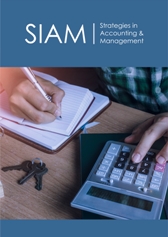- Submissions

Full Text
Strategies in Accounting and Management
Taxation of US 401(K) Plans Based on the German Annual Tax Act 2024
Sebastian Lang*
Professor of Finance, Investments and Accounting and Dean of studies in Banking and Finance, Germany
*Corresponding author:Sebastian Lang, professor of Finance, Investments and Accounting and Dean of studies in Banking and Finance, Berufliche Hochschule Hamburg (BHH), Germany and School of Finance and Swiss Institute of Banking and Finance, University of St.Gallen, Switzerland
Submission:May 22, 2025;Published: May 28, 2025

ISSN:2770-6648Volume5 Issue 3
Abstract
The German Annual Tax Acts are statutory instruments enacted annually to make changes and adjustments to the German tax law. The objective of the Annual Tax Acts is to update existing tax laws and adapt them to changing economic and political conditions. The German Annual Tax Act 2024 ruled that deferred taxation applies also to retirement benefits from foreign pension funds, for which a tax exemption or preferential treatment was granted. It governs that future payouts from U.S. 401(k) plans to taxable persons in Germany are fully taxed. The new law applies for the first time in the fiscal year 2025.
Keywords:Income taxation; U.S. 401(k) Plans; German Annual Tax Act 2024
Introduction
In Germany payments from private and corporate pension plans, for which tax-exempt contributions were made, are fully taxed as other income during the payout phase1. No tax exemption limit applies, unlike for corporate direct pension commitments and or civil servants´ pensions. For converted insurance contracts, full taxation applies only pro rata to the capital accumulated after the conversion. The system of tax-exempt contributions in the savings phase and the taxable benefits in the retirement phase is called “deferred taxation”. Although contributions to subsidized retirement savings plans are in principle made from already taxed income, they are ultimately tax-free due to a special expense deduction possibility. The nonsubsidized part of private pensions is only taxable with regard to the investment returns of the pension plan. This is mainly a tax on the interest earned on the accumulated capital and is calculated based on the age at which the pension begins and the duration of the pension. In contrast, retirement income from bank savings or investment plans are fully taxed as income from capital investments. Capital gains from funds are tax-free for non-subsidized pension plans, if contributions were made before December 31, 2008, and the investments were held for more than one year. For funds acquired after January 1, 2009, a withholding tax of 25 percent applies upon sale.
Deferred Taxation of Private Pensions in Germany
Section 22 No. 5 of the German Income Tax Act governs the taxation of retirement savings contracts and details that contributions are tax-privileged during the savings period of a retirement plan, and retirement benefits are fully taxed later. Furthermore, if retirement benefits do not originate from tax- privileged contributions - i.e. from already taxed income - then only the investment returns of the retirement benefits are taxed3. Therefore, technically speaking, pension plans have to separately list tax-privileged and non-privileged contributions made to the pension plan during the savings phase.
The consequence of this rule is that, for example, employees who saved in retirement plans in the U.S.A., such as 401(k) plans, and whose benefits are paid out after moving back to Germany could, according to the German Federal Tax Court, only be taxed with regard to the investment returns of the 401(k) plan4. The reasoning until now was that during the savings phase, taxpayers who were not subject to income tax in Germany did not benefit from favorable tax exemptions [1-4]. Therefore, the payments did not originate from tax-privileged contributions and hence, no deferred taxation applies, but only investment returns are taxed according to Section 22 No. 5 Sentence 2 of the German Income Tax Act.
Extension of the Deferred Taxation Principle in Germany
The German Annual Tax Act 2024 regulates that deferred taxation applies also to retirement benefits from contributions to foreign pension funds, for which tax exemptions or preferential treatments were granted in Germany or in another country. This intends to ensure that future payouts to taxable persons in Germany from, for example U.S. 401(k) plans, will be fully taxed in Germany. The new law applies for the first time in the fiscal year 2025.
Conclusion
The Federal Republic of Germany and the United States of America agreed on the avoidance of double taxation and the prevention of income and capital tax evasion in a double taxation agreement in the year 2008. If taxpayers who are employed in Germany, after moving back to Germany from the U.S.A., voluntarily continue to make own contributions from previously taxed German income to U.S. retirement plans, they could until now, make use of a special expense deduction according to Section 10a of the German Income Tax Act pursuant to Article 18A (2) of the U.S.-German Double Taxation Agreement. Considering the new extension of the deferred taxation principle of pension plans in Germany, special expense deduction possibility will most likely undergo further scrutiny in the future.
References
- German Income Tax Act.
- S.-German Double Taxation Agreement.
- German Federal Finance Ministry, Annual Tax Act 2024, Federal Law Gazette.
- German Federal Tax Court of October 28, 2020, X R 29/18, Federal Tax Gazette II 2021, 675.
© 2025 Sebastian Lang. This is an open access article distributed under the terms of the Creative Commons Attribution License , which permits unrestricted use, distribution, and build upon your work non-commercially.
 a Creative Commons Attribution 4.0 International License. Based on a work at www.crimsonpublishers.com.
Best viewed in
a Creative Commons Attribution 4.0 International License. Based on a work at www.crimsonpublishers.com.
Best viewed in 







.jpg)






























 Editorial Board Registrations
Editorial Board Registrations Submit your Article
Submit your Article Refer a Friend
Refer a Friend Advertise With Us
Advertise With Us
.jpg)






.jpg)














.bmp)
.jpg)
.png)
.jpg)










.jpg)






.png)

.png)



.png)






